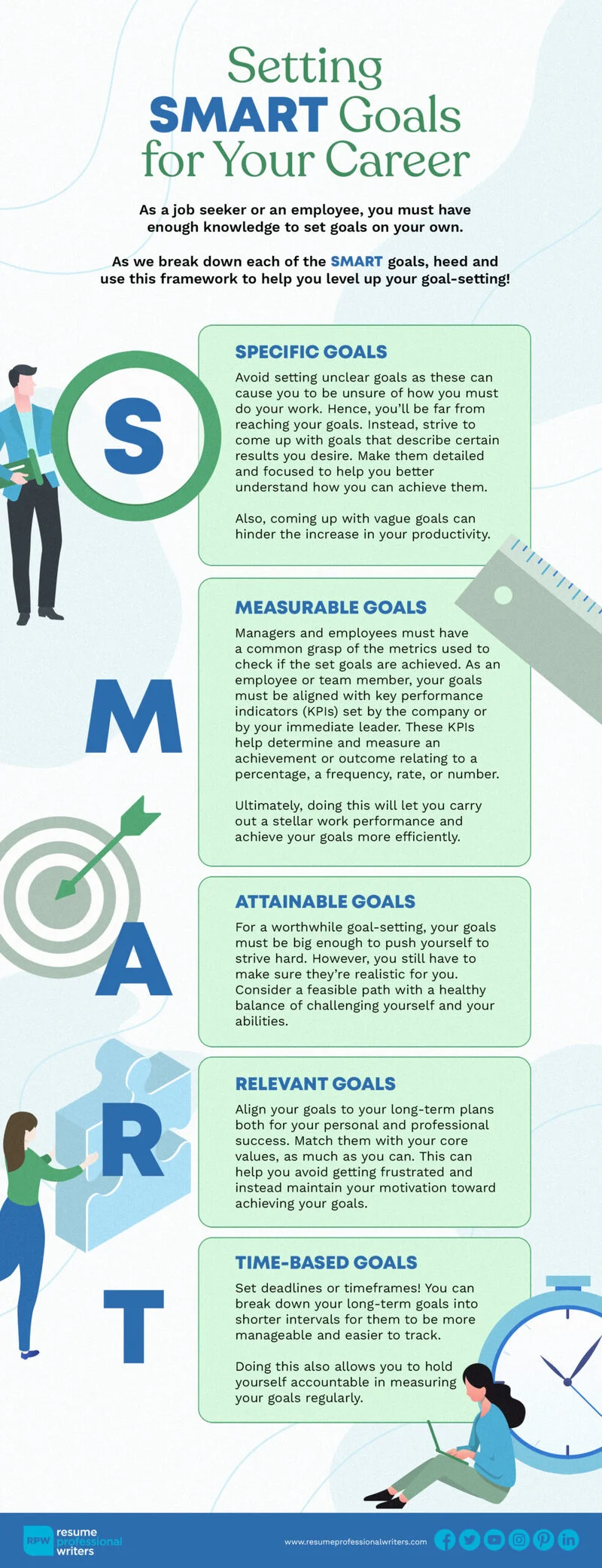In building a career path, intentional goal-setting is a must. Doing this helps you allocate your time and resources more efficiently to achieve the goals you’ve set for yourself. Otherwise, having no clear career roadmap may hinder you from getting the results you want and need. As challenging as it may seem, setting your goals can be easier if you follow a certain set of criteria or framework. With that, coming up with SMART goals can help you be one step closer to your success.
Now, how do you ensure you’re setting goals SMART-ly to help you achieve career success? Heed the top tips and SMART goals examples for work in this in-depth guide!

Defining and Setting SMART Goals
Why is setting goals important? How can this process help me succeed in my career?
Being able to set goals is part of a long-term plan for both your personal and professional development. This process helps you form habits, guides your focus, and sustains your drive to achieve things. More so, be conscious in setting your goals, as these will play a vital role in determining your career success. Hence, you have to be SMART about it.
What makes a SMART goal? How can I set one?
The SMART goals model is said to have been developed by Peter Drucker (1955) and G.T. Doran (1991).
For employees, managers, and organizations, SMART goal-setting allows them to create, track, and turn their objectives into results. The acronym SMART stands for Specific, Measurable, Attainable, Relevant, and Time-based. These represent how the process can help you create clear and trackable goals.
The role of a manager is crucial in helping employees set, understand, and accomplish their goals. However, you must have enough knowledge to set goals on your own. As we break down each of the SMART goals, heed and use this framework to help you level up your goal-setting!

Specific Goals
Avoid setting unclear goals as these can cause you to be unsure of how you must do your work. Hence, you’ll be far from reaching your goals. Instead, strive to come up with those that describe certain results you desire. Make them detailed and focused to help you better understand how you can achieve them.
Also, coming up with vague goals can hinder the increase in your productivity.
Now, what questions should you ask yourself to check if your goals are specific? Here are some of them:
- Are my goals precise?
- What outcomes do we aim to achieve?
- What strategies should I follow?
Measurable Goals
Managers and employees must have a common grasp of the metrics used to check if the set goals are achieved. As an employee or team member, your goals must be aligned with key performance indicators (KPIs) set by the company or by your immediate leader. These KPIs help determine and measure an achievement or outcome relating to a percentage, a frequency, rate, or number.
Ultimately, doing this will let you carry out a stellar work performance and achieve your goals more efficiently.
Further, ask yourself these:
- Can I measure the success of my goals through quantity or quality?
- What criteria should I follow to track my goal achievement progress?
- How will I know if significant progress has occurred?
Attainable Goals
For a worthwhile goal-setting, your goals must be big enough to push yourself to strive hard. However, you still have to make sure they’re realistic for you. Consider a feasible path with a healthy balance of challenging yourself and your abilities.
With that, how can you ensure that your goals are attainable? Let these help you find out:
- Are my goals doable given the time and resources I have?
- How can my manager or leader support me in achieving my goals?
- Does my goal allow me to challenge my ability?
Relevant Goals
Align your goals with your long-term plans both for your personal and professional success. Match them with your core values, as much as you can. This can help you avoid getting frustrated and instead maintain your motivation toward achieving your goals.
Also, make sure your goals align with your desired career path by reflecting on these questions:
- Can my goal contribute to my personal growth?
- What does this goal mean to my team?
- How can it support the overall success of the business?
Time-Based Goals
Set deadlines or timeframes! You can break down your long-term goals into shorter intervals for them to be more manageable and easier to track.
Doing this also allows you to hold yourself accountable in measuring your goals regularly. To check if you have time-based goals, review these points:
- In achieving the goals, is there an agreed date?
- Is the target date in line with the quality of the goal rather than just for the sake of it being attained?
- Is the timeline feasible?
Further, if you’re that someone who always wants to take things up a notch, then you may try to upgrade your SMART goals! Some authors have expanded the SMART goal-setting framework into SMARTER, to include Evaluated and Readjusted. True enough, you also have to make time to sit down, reflect, and assess if your set SMART goals are still in line with your desired career path. Likewise, if after gauging your set goals you find that it’s time to make new ones, you can readjust them to fit your revised career roadmap.

Download this “Setting SMART Goals for Your Career” infographic now.
Two Types of Goals for Employees
Employees like you can set two types of SMART goals to further guide you in mapping out your career plans.
Performance goals: Set goals to improve your employee performance by managing and meeting expectations related to your job tasks, focusing on your performance management and driving quality results.
Professional development goals: These, on the other hand, let you focus on improving and increasing your capabilities and competencies to enhance your skill set and knowledge.
Having a conscious way of setting and grouping your goals allows you to be more certain about writing down your goals and how you plan to turn them into reality.
SMART Goals Examples for Work
If you’re just starting to improve your way of setting goals, you may find yourself wondering where to begin. Fret not! We’ve created SMART goals examples for work that you can use as guide as you write your own.
Before anything else, we figured you might want to test yourself first before you dive into thinking about and writing down your goals. Heed the following pointers first.
Career Assessment
To help you better set your goals, take an online career quiz to find out your strengths, skills, and even the ideal jobs you can take on!
Setting SMART Goals for Your Desired Career Path
Note that you can construct your own set of goals as long as you follow the SMART goals framework effectively!
Examples of SMART Goals for Job Promotion
- I aim to earn a role managing my own business development team in a world-class e-commerce company in three years.
- I must gain enough skills and knowledge through additional training and experience for at least 3 years to achieve my goal of being qualified for the marketing head position.
Examples of SMART Goals for Career Change
- To support my desire to shift to a different career path, I need to connect with an industry expert to gain relevant first-hand experiences after a year, to help me determine my interest in this field.
- For me to change careers from customer service to IT, I must hone my transferable skills and gain IT-related ones to land my target IT role in 1 year or less.

Refocus the Flow of Your Resume in Line with Your Career Goals
As you set and write SMART goals for your career, your job search tools must be aligned with them. Starting with your resume, your career goals must be evident on how you write your work history, qualifications profile, and skill sets. This allows you to form a more cohesive narrative of who you are as a professional, and what you intend to achieve in a certain period of time.
Aside from aligning your resume with your goals, consider taking steps to win your target job through the eyes of the hiring managers. That said, check the job description of your target position. Review the main job responsibilities, required skills, and other qualifications for the role. Afterwards, double-check or rewrite your resume to ensure that your skills, work history, and other qualifications reflect the job requirements. To let hiring managers and recruiters know if you’re the one they’re looking for, ensure that your resume “shows” and not just “tells” why they must consider you. This will increase your chances of landing your target job!
However, writing an effective resume that’s aligned with your goals and appealing to hiring managers can be a tough task. Plus, you’ll have to dedicate time and resources to write one. Tiresome, isn’t it?
This is why Resume Professional Writers is here! Our team of career experts write job search tools that reflect your career goals while ensuring it’s optimized to your target job. Invest on your resume and let us do the writing for you! Check out our best resume writing services now and see what’s in store for you and your career. You may also visit our resume examples to see how we ensure your resume can do the “talking” for you!








